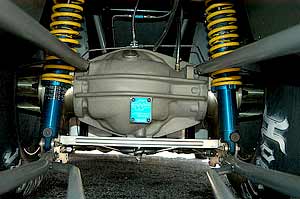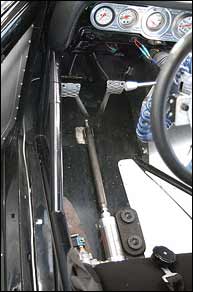
Strength and reliability
dictated the choice of a Mark Williams Enterprises
rearend under the Rambler. |

Upon arriving back at their shop in Marietta,
GA, Wilder says the team was pleasantly surprised
to find it fit, "but just barely" after a lot
of in-house fabrication to shoehorn the 526-cubic-inch
hemi into the engine bay, including machining
some pre-made parts and building others from
scratch.
The engine currently puts out about 2,100 horsepower,
but Wilder is confident it could produce 2,700
with a more aggressive tune-up. Regardless,
to make sure the drivetrain stays together when
he hits the loud pedal, Wilder went with a Lenco
transmission backed up by a Funny Car-grade
rearend housing and axles because he wanted
to avoid the
constant welding repairs that even hand-fabricated
steel rearends require. "These cars are 3,000
or 3,100 pounds and we run them so hard that
we shake the tires constantly and that can cause
stress cracks," he says. "The Mark Williams
rearend that we've got in there now is bulletproof.
You put it in there and you're done."
One of the more unusual features of the car
is the pneumatic clutch pedal and throttle release
set-up, similar to what Scotty Cannon ran in
his Pro Mod car a few years ago. Powered by
a single air tank, one air solenoid triggers
a shaft that moves forward to physically hold
the clutch pedal in during staging, while a
second solenoid holds engine rpm to a pre-set
limit despite Wilder's foot pressing the gas
pedal to the floor. Wilder had the system installed
because nearly all of his Outlaw 10.5 competitors
are running automatics with transbrakes. "Your
foot can't move off a clutch fast enough to
cut a light with a transbrake car," he says.
"So, you have to make it air and electric to
compete with them."
 |
 |
|
(above) B&S Shifter
built the one-off system that's powered
by a compressed air tank mounted behind
the passenger seat.
(left) The shaft below
the driver's left leg is forced forward
by air pressure to hold the clutch pedal
in while staging.
|

|